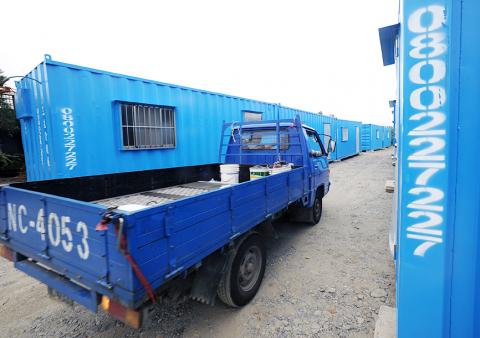The Central Weather Bureau yesterday said it would not pursue legal action against a doomsayer who claimed on his Web site that a magnitude 14 earthquake would hit Taiwan next month.
The bureau said the individual, known as “Teacher Wang” (王), had written on his blog that based on his reading of the Chinese classic I Ching (易經) — also known as the Book of Changes — the super earthquake would hit at 10:42:37am on May 11.
He also claimed that a tsunami would hit on May 17 that could generate a wave as high as 170m.

Photo: AFP/Sam YEH
Some media picked up Wang’s claims and a TV station interviewed him about his “research,” the bureau said.
After Wang’s Web post, some of his followers in Puli (埔里), Nantou County, began building about 170 shelters converted from cargo containers, the Apple Daily reported. Wang also claimed that millions of people would die in the cataclysm.
Wang advised people to stay in cargo containers, which he said would be safer than regular buildings, the paper said, also quoting construction workers as saying that they were rushing to finish by early next month.
To counter what it characterized as groundless claims, the bureau dismissed Wang’s comments as “nonsense” and had initially planned to fine Wang and the blog service provider for allowing Wang to publish comments in violation of the Meteorological Act (氣象法).
The act makes the bureau the only government body allowed to issue weather forecasts or warnings of hazardous meteorological and seismological phenomena. Article 24 of the act stipulates that people who report on such matters without securing permission from the bureau can be fined between NT$200,000 (US$6,973) and NT$1 million.
However, the bureau decided not to impose a fine on either after the blog operator voluntarily removed Wang’s comments.
However, the bureau said it would continue to monitor Wang’s comments.
ADDITIONAL REPORTING BY AFP

Alain Robert, known as the "French Spider-Man," praised Alex Honnold as exceptionally well-prepared after the US climber completed a free solo ascent of Taipei 101 yesterday. Robert said Honnold's ascent of the 508m-tall skyscraper in just more than one-and-a-half hours without using safety ropes or equipment was a remarkable achievement. "This is my life," he said in an interview conducted in French, adding that he liked the feeling of being "on the edge of danger." The 63-year-old Frenchman climbed Taipei 101 using ropes in December 2004, taking about four hours to reach the top. On a one-to-10 scale of difficulty, Robert said Taipei 101

Nipah virus infection is to be officially listed as a category 5 notifiable infectious disease in Taiwan in March, while clinical treatment guidelines are being formulated, the Centers for Disease Control (CDC) said yesterday. With Nipah infections being reported in other countries and considering its relatively high fatality rate, the centers on Jan. 16 announced that it would be listed as a notifiable infectious disease to bolster the nation’s systematic early warning system and increase public awareness, the CDC said. Bangladesh reported four fatal cases last year in separate districts, with three linked to raw date palm sap consumption, CDC Epidemic Intelligence

Two Taiwanese prosecutors were questioned by Chinese security personnel at their hotel during a trip to China’s Henan Province this month, the Mainland Affairs Council (MAC) said yesterday. The officers had personal information on the prosecutors, including “when they were assigned to their posts, their work locations and job titles,” MAC Deputy Minister and spokesman Liang Wen-chieh (梁文傑) said. On top of asking about their agencies and positions, the officers also questioned the prosecutors about the Cross-Strait Joint Crime-Fighting and Judicial Mutual Assistance Agreement, a pact that serves as the framework for Taiwan-China cooperation on combating crime and providing judicial assistance, Liang

US climber Alex Honnold left Taiwan this morning a day after completing a free-solo ascent of Taipei 101, a feat that drew cheers from onlookers and gained widespread international attention. Honnold yesterday scaled the 101-story skyscraper without a rope or safety harness. The climb — the highest urban free-solo ascent ever attempted — took just more than 90 minutes and was streamed live on Netflix. It was covered by major international news outlets including CNN, the New York Times, the Guardian and the Wall Street Journal. As Honnold prepared to leave Taiwan today, he attracted a crowd when he and his wife, Sanni,